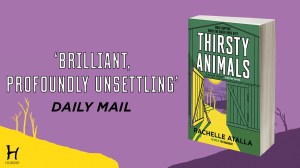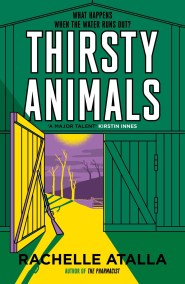Rachelle Atalla’s inspiration behind Thirsty Animals
I have always been fascinated by water. All life is dependent upon it, humans composed of more water than anything else. In the UK, and particularly in Scotland where I live, there has always been an abundance of fresh drinking water – all you have to do is turn on the tap. It is something to be taken for granted, so much so that we flush our toilets, wash our cars and hydrate our plants all with drinkable water. It is difficult to imagine something so vital being taken away from you when you’ve had its luxury your entire life. Yet for many this has never been their reality, and millions of people around the world today still have no real means of accessing clean water. With the effects of climate change already being seen, from climate displacement to water being treated as a commodity for profit, supply issues are only expected to worsen, and no one is immune from the challenges we face.
The impossible doesn’t seem so hard to imagine anymore. One day, in my local town where nothing particularly dramatic ever happens, a huge underground water pipe burst. As a result, water flooded the streets, destroyed road surfaces, submerged cars, and forced people to evacuate the immediate area. Hundreds of thousands of litres of drinking water were lost to the ground below, the infrastructure so antiquated with little investment or effort ever having been made to improve it. Panicked, residents started filling their homes with buckets of water because rumours began to circulate that by morning there would be nothing left in the taps. We were poised with a societal quandary: were we going to approach this crisis in a collective, community-based manner and limit what we took so that there was enough for everyone? Or were we going to behave in a more individualistic way, one of self-preservation? As it happened, no one ran out of water and normal order was restored. But for the briefest of moments, it felt as if all social constructs could collapse and that we were on the brink of something new.
When I came to the realisation that I wanted to write a novel about water scarcity, I had no idea where I was going to set it. It needed to be a transient place, where people under extreme circumstances could meet. And then I was invited to stay a friend’s family farm in the rural countryside near the Scotland-England border. Unbeknown to me, it was lambing season, busy, and we were expected to help. Very much out of character, but with guidance and encouragement, I safely delivered a healthy lamb into this world. I watched him get to his feet, be licked by his mother and begin his life. I found it to be a profoundly moving experience. Yet I was not allowed to dwell for too long because that evening, the family cooked us lamb for dinner, completing the livestock circle of life. It occurred to me that there was no better place in which to explore the complexities of life and death than on a livestock farm. Everything could be found there.
From all of this, like pieces of a fragmented jigsaw, came Thirsty Animals.
'Original, timely, terrifying' CHRIS WHITAKER
'Brilliant, profoundly unsettling' DAILY MAIL
WHAT HAPPENS WHEN THE WATER RUNS OUT?
THE WORLD IS RUNNING OUT OF WATER.
With supply in the cities drying up, Aida is forced back home to live with her mum at their rural Scottish farm. The border is closed. Tensions are close to breaking point. For now, Aida and her mother have just enough to get by.
But then suspicious strangers arrive asking for help, Aida and her family face a terrible decision. How much water can they afford to share?
AND THEN THE TAPS ARE TURNED OFF.
Can they survive long enough for the rain to come?
Completely compelling, devastating and thought-provoking, Thirsty Animals takes us on a captivating journey of survival and self-discovery.
'Beautifully written, vivid and unflinching, it confirms Atalla as a real talent' DOUG JOHNSTONE
'A master of slow-burning tension and unease . . . The pace of the story builds to an unputdownable conclusion, and the characters will stay with the reader for a long time' CAILEAN STEED



